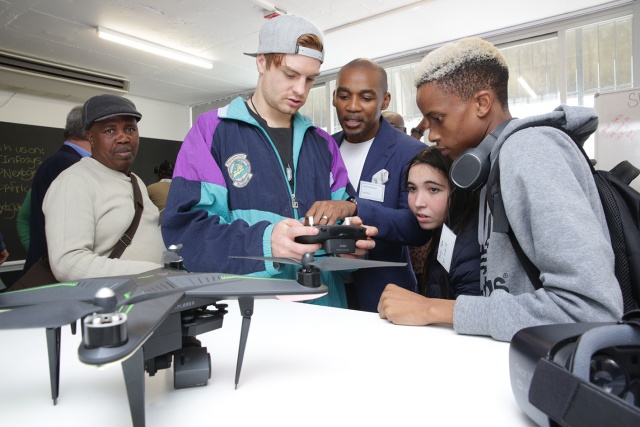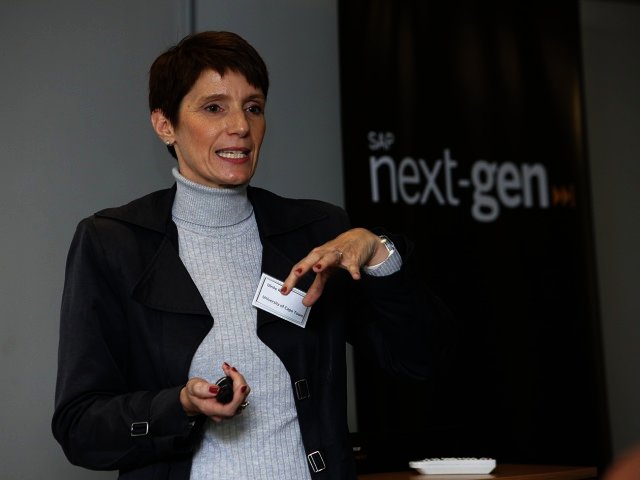By 2020, nearly half of the total workforce will be made up of Millennials, the young, connected and tech-savvy demographic born between the early 1980s and the mid-1990s. Despite this, the latest PwC CEO survey found that one of the biggest challenges for organisations will be engaging and retaining Millennial workers. Enter the SAP Next-Gen Lab at the University of Cape Town, a first-of-its-kind facility on the African continent that aims to foster closer collaborative relationships between universities, students and the broader corporate sector.
According to Ann Rosenberg, senior vice president and global head of SAP Next-Gen, many companies are realising that looking only inward for innovation is not sufficient to meet the demands of effective digital transformation. "We are pleased to support South Africa as a country and Africa as a continent with building up a digitally educated next generation talent pool with skills on both enterprise systems and digital innovation with analytics, machine learning, blockchain technology and more. SAP Next-Gen is a key part of enabling this, as the program connects customers to academic thought leaders and researchers, students, startups, accelerators, tech community partners, purpose driven partners, venture firms, futurists, and SAP experts to reimagine the future of industries with SAP Leonardo, seed in disruptive innovation with startups, and build skills for digital futures,” says Rosenberg.
SAP Next-Gen is a purpose driven innovation community supporting SAP’s commitment to the 17 UN Global Goals for sustainable development, and an innovation platform for SAP’s 378 000+ customers across 25 industries in 180+ countries. The platform leverages 3 500+ educational institutions in 113 countries that are members of the SAP University Alliances and SAP Young Thinkers programmes, as well as startups, accelerators, tech community partners, purpose driven partners, venture firms, futurists, and 83+ SAP Next-Gen labs/hubs at universities, accelerators, and SAP locations.
"Millennials are the most connected, informed and empowered generation in history. Many of the world's most successful exponential organisations were founded by millennials. There are great opportunities to engage with them and tap into their new way of thinking. Our SAP Next-Gen Labs enable companies to accelerate their innovation agendas, and link innovation to purpose, by leveraging the disruptive insights of millennials", says Rosenberg.

Meeting place for collaboration and “innovation with purpose”
The newly launched lab at the University of Cape Town is a physical space on campus that takes a non-traditional approach to the classroom environment. "We wanted to create a space where students can - interact with companies and work on industry-related challenges, next generation projects, and blue-sky ideas. It's a co-creation and working space built on design thinking principles to stimulate and encourage innovative thinking, collaboration, and knowledge-sharing," says Professor Ingrid Woolard, dean of the Faculty of Commerce.
The lab is a collaboration between SAP Next-Gen and UCT’s School of IT, a joint initiative which incorporates the Department of Information Systems in the Faculty of Commerce and the Department of Computer Science in the Faculty of Science. Professor Ulrike Rivett, Director of the School of IT sees the Lab as an opportunity for the University to contribute to solving meaningful problems in industry. "Too often, interactions between business and our students are geared mainly towards recruitment. While initiatives that assess the skills of students are important, these generally miss the opportunity of utilising the available pool of creative talent to co-create inventive solutions to real-world issues."
In Deloitte's 2017 Millennial Survey, 84% of South African millennials believed business will have a positive impact on broader society, beating the global average of 76%. "South Africa's young and talented millennial workforce is ready to contribute in meaningful ways to overcoming the challenges ahead. We believe that by empowering young people and enabling them to expand their professional networks, we are giving them a launchpad to break beyond academic theory and gain real-life experience with the latest technology and business strategies," says Professor Ingrid Woolard, Dean of the Faculty of Commerce.
According to Mehmood Khan, chief operating officer at SAP Africa, South African educational institutions are striving to meet the challenges associated with fast-paced digital transformation and the demand for relevant skills. "South Africa's talent pool is relatively small, so most companies are competing for the same scarce skills. The interactions taking place in this new lab at UCT will give companies an opportunity to gain some pre-recruitment insight into candidates and get a better idea of who will be a good fit for their organisation. It also helps universities close what is known as the 'grad gap', the disconnect between theoretical knowledge and real-life skills requirements. By having a physical presence on campus, SAP is able to work directly with academics, students, customers and partners to stimulate and accelerate innovation." Professor Irwin Brown, the Head of the Department of Information Systems agrees, "Information Systems has many ongoing relationships with public sector entities, companies and NGOs where we collaborate to ensure that the curriculum of our programmes remains relevant. However, this initiative is different in that it extends the interaction to a partnership between industry players, students and academics, that is mutually beneficial to all parties. "
Multi-pronged approach to addressing SA’s skills deficit
The opening of the Next-Gen Lab at UCT is part of SAP's broader skills development initiatives that include Africa Code Week, which in 2017 trained more than 1.3 million African youth in basic coding skills, and SAP Skills For Africa, which focuses on training and certifying selected graduates in a broad spectrum of SAP software and business solutions and has provided training and job placement opportunities for more than 560 consultants across several African countries.
"In 2017, we also launched the Africa chapter of the Women in Data Science (WiDS) initiative. WiDS is an initiative of Stanford University in the US, and aims to encourage women to pursue careers in data science, which McKinsey estimates will have a 50% skills deficiency globally in the coming years. We have allocated five bursaries to women wishing to pursue postgraduate qualifications in data science, which will be awarded in 2018. The lab will also play a key role here as a meeting place for WiDS community members to come together and collaborate with their global peers via virtual conferences and other networking opportunities,” says Khan.





